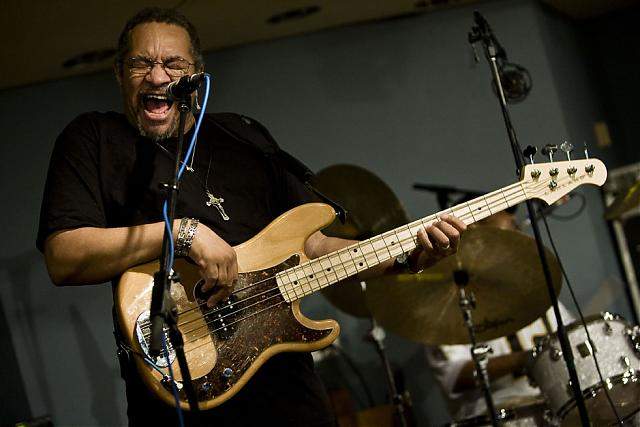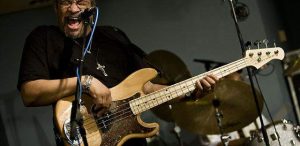
Meter Man: A five track introduction to George Porter Jr.
Bassist and songwriter George Porter Jr. grew up in New Orleans, the southern U.S. entrepôt known for its creole culture, jazz, zydeco and brass band music. In the early-to-mid-sixties, fellow New Orleans musician Art Neville convinced Porter Jr. to join him in forming Neville Sounds, the group which evolved into funk four-piece (and later five-piece with the addition of percussionist Cyril Neville) The Meters.
They became the house band for the label of late pianist, songwriter and producer Allen Toussaint, during a period in which New Orleans artists stamped their mark on R&B, soul and funk. Following The Meters’ disbandment, new projects naturally beckoned, but each member of the group retained a healthy relationship with the group’s legacy. They once reformed in the late eighties and the surviving members accepted a lifetime achievement award from the Recording Academy earlier this year.
Porter Jr. has done a number of great things away from The Meters. An in-demand session player, he’s found himself working with a diverse range of artists, including Patti Labelle, David Byrne and Tori Amos among others. He’s also played with a number of groups: Joyride, his own Runnin’ Pardners and The New Orleans Social Club – a group formed in response to Hurricane Katrina, which brought death and destruction to New Orleans in 2005.
Despite a recent fall, causing alarm and some tenderness in the shoulder, the GRAMMY-winning bassist is fighting fit and raring to go! He and The Runnin’ Pardners perform live at Band on the Wall on 20th September and here’s a five track introduction to George and his music, to get you in the mood.
Allen Toussaint – Out of the City (Into Country Life) (Life, Love and Faith 1972)
Allen Toussaint’s 1970 solo return, Toussaint, had featured some tremendous songs and backing musicians, but much of the material had been written for other artists. Life, Love and Faith heard Toussaint cut loose, recruiting The Meters to help him realise his ambitious compositions. Out of the City (Into Country Life) is at first an archetypal Meters groove, a fuzztone riff and chunky backbeat, perfectly executed. Porter Jr. joins the arrangement just as Toussaint purrs — seemingly through a Leslie speaker or vibrato unit — his awe-inspiring hook: “I don’t wanna run no more.” But come the chorus, the arrangement is flung wide open, a country-funk scene change effortlessly handled by the accomplished R&B unit. Each man’s role is simple, but the whole is greater than the sum of its parts. Sheer R&B genius. Following their gig with Toussaint, a stint with Dr. John naturally beckoned and the awesome In The Right Place resulted.
The Meters – Can You Do Without? (Fire on the Bayou, 1975)
To say that The Meters were experienced by the time they released Fire on the Bayou is an understatement. They’d put out five studio LPs, five not-on-LP singles and been the backing band on records by Lee Dorsey, Dr. John, Allen Toussaint and LaBelle. But despite the merits of their earlier work, Billboard’s Best Rhythm & Blues Instrumental Group, 1970, had yet to find permanence in the charts. Then in ‘75, Paul McCartney invited them to play at a Wings album release party in California. Mick Jagger was in attendance and signed them up to open on The Rolling Stones’ tour of the Americas in ’75 and Europe in ’76. They released Fire on the Bayou in the midst of the Americas leg of the tour and it sold well (even if the figures fell short of their label’s lofty expectations.) Allen Toussaint produced and B-side opener Can You Do Without? was a standout number, Porter Jr.’s gorgeous bassline ushering in a laid back funk groove and instantly memorable hook. If you want an example of Porter Jr.’s subtlety, tone and understated creativity, this is your number!
Albert King – Flat Tire (New Orleans Heat, 1978)
When Mississippi-born bluesman Albert King made his way down South to sample the New Orleans heat, Allen Toussaint and George Porter Jr. were obvious hook-ups for the electric blues player. It may’ve been the rhythms they cooked up that had King dabbing his face on the LP cover, as there are plenty of signature New Orleans grooves to choose from. But Porter Jr.’s bass riff on the album-closing instrumental is the perfect one to pick out. Rather than kicking this track off, Porter Jr. leaps behind the melody established by King’s lead guitar. When King begins soloing, you hear Porter Jr. holding it down, throwing in the occasional variation as King lets off steam and hollas in approval.
John Scofield – But I Like the Message (Piety Street, 2009)
Jazz guitarist John Scofield, like many musicians, was attracted to the New Orleans sound. His Piety Street Band saw him link up with pianist Jon Cleary among others, who Porter Jr. had worked with since the late eighties. But I Like the Message is pure joy, Cleary’s nimbled-fingered piano playing gliding beneath Scofield’s lead playing, Porter Jr. playing a complementary walking figure and Shannon Powell throwing some fine tambourine into the mix, for good measure.
George Porter Jr. & The Runnin’ Pardners – The Mob (Can’t Beat the Funk!, 2011)
With its lead riff not dissimilar to a Bennie Maupin sax lick from the jazz-funk classic Watermelon Man, this slow R&B groove is wrought with feeling and capped off by some ultra-cool Hammond organ playing. Porter Jr. has been setting the pace for some time and his revolving cast of Runnin’ Pardners have been hand selected for their ability to keep up, and take the lead when called upon!







